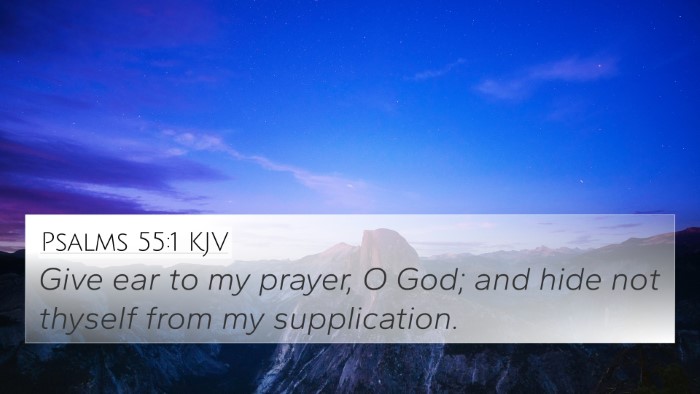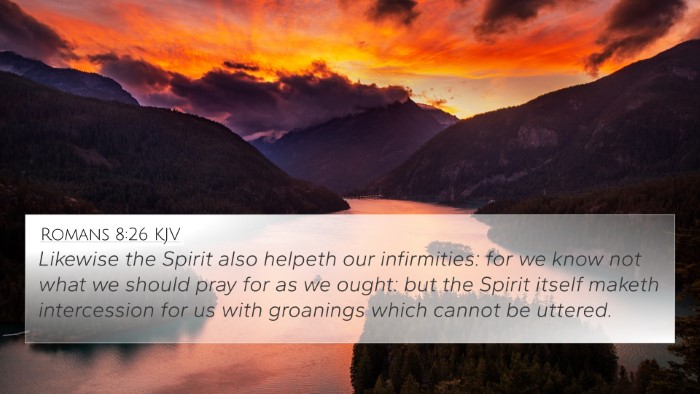Understanding Psalms 5:1
Psalms 5:1: "Give ear to my words, O LORD, consider my meditation."
This verse expresses a profound plea for God's attention and understanding. The psalmist is not simply asking for God to hear his spoken words but also to take note of his inner thoughts and meditations. This reflects the intimate relationship between the believer and God, emphasizing the importance of both external prayers and internal reflections.
Meaning and Interpretation
The insights from public domain commentaries provide a rich understanding of this verse:
-
Matthew Henry's Commentary:
Henry emphasizes the earnestness of prayer, indicating that the psalmist desires not just to be heard, but for the Lord to consider the depth of his heart and thoughts. He notes that it points to the necessity of genuine devotion in prayers, where both our audible supplications and silent meditations are laid before God.
-
Albert Barnes' Commentary:
Barnes introduces the idea of God as a responsive listener. He underscores the contrast between human communication and divine communication. This verse signals that God is attentive to both our spoken prayers and our unspoken meditations, implying that God’s understanding reaches beyond the surface of our words into our spiritual operations.
-
Adam Clarke's Commentary:
Clarke points out that this verse reveals a dual aspect of prayer: the verbal and the meditative. He emphasizes that meditation is as significant as prayer itself, serving as a vital component in the believer's life, thus urging the followers of Christ to engage in careful thought and reflection on God’s word.
Bible Verse Cross-References
Understanding Psalms 5:1 is enhanced through cross-references that illuminate related themes and messages throughout Scripture. Here are notable connections:
- Psalms 19:14: "Let the words of my mouth and the meditation of my heart be acceptable in your sight, O LORD, my rock and my redeemer." - This verse similarly combines the concepts of words and meditation, highlighting the desired acceptance by God.
- Psalms 39:12: "Hear my prayer, O LORD, and give ear to my cry; do not be silent at my tears! For I am a sojourner with you, a guest like all my fathers." - This illustrates the urgency and vulnerability in prayer, paralleling the plea in Psalms 5:1.
- Psalms 141:2: "Let my prayer be counted as incense before you, and the lifting up of my hands as the evening sacrifice!" - This links prayer and the act of meditation to worship, a common theme in Psalms.
- Philippians 4:6-7: "Do not be anxious about anything, but in everything by prayer and supplication with thanksgiving let your requests be made known to God." - Here, the connection to prayer and supplication mirrors the heartfelt actions portrayed in Psalms 5:1.
- 1 Peter 5:7: "Cast all your anxieties on him, because he cares for you." - Reinforces the invitation to bring all concerns before God, aligning with the approach of the psalmist.
- Romans 12:2: "Do not be conformed to this world, but be transformed by the renewal of your mind, that by testing you may discern what is the will of God." - This emphasis on thoughtful meditation aligns with the psalmist’s call to consider his meditations.
- Luke 6:12: "In these days he went out to the mountain to pray, and all night he continued in prayer to God." - This demonstrates the significance of prayer to Jesus, connecting with the fervor present in Psalms 5:1.
Thematic Connections in Scripture
This verse emphasizes themes of prayer, meditation, and divine attentiveness, creating thematic connections across the Bible:
- Intimacy with God: Both the psalmist and every believer are encouraged to approach God with genuine intentions, knowing that their innermost thoughts and prayers are acknowledged.
- Importance of Meditation: Meditation is showcased as a crucial part of the spiritual life, inviting believers to reflect deeply on God’s word as they offer their prayers.
- God's Understanding: Psalms 5:1 reinforces the belief that God is not just a distant deity but one who actively listens and understands the hearts of his people.
Tools for Bible Cross-Referencing
For a deeper exploration of inter-Biblical dialogue and connections, consider utilizing various tools such as:
- Bible Concordance: A helpful tool to find key terms and their occurrences throughout Scripture.
- Bible Cross-Reference Guide: Guides that help identify relationships between different Bible verses.
- Cross-reference Bible Study: Methods that engage readers in exploring thematic and narrative similarities across passages.
Conclusion
In summary, Psalms 5:1 encapsulates a heartfelt request to God for attention to both spoken words and internal musings. The echoes of this verse can be traced throughout Scripture, underlining the significant role of meditation and prayer in the believer's life. Understanding this verse within its broader context and through its connections enriches one's spiritual journey and practice.














